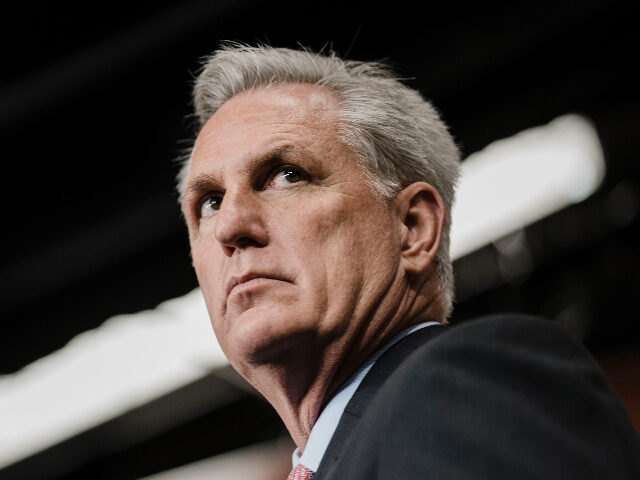As House Republicans continue pressuring Speaker Kevin McCarthy (R-CA) and their colleagues to use Congress’s power of the purse to block radical Biden administration excesses and advance priorities like border security, the Senate has coalesced behind Majority Leader Chuck Schumer (D-NY) to advance government spending legislation.
With the September 30 deadline to pass legislation to continue the operation of the federal government nearing, factions in the House and Senate are preparing for a House conservative-led spending battle likely to extend until the end of the year as a continuing resolution to maintain current spending levels through the current deadline appears an increasing certainty. Yet the Senate is striking first, advancing legislation lacking conservative spending and policy priorities to gain strategic high ground in negotiations.
“Democrats and Republicans all must get on the same page about keeping the government open and avoiding a pointless shutdown,” Schumer said on the Senate floor. Schumer announced that next week the Senate will consider a minibus — Washington-speak for a single bill comprising multiple spending bills — funding transportation, military construction, and agriculture — relatively non-controversial pieces of legislation.
While the Senate bill will be open to amendment, according to top Republican appropriator and moderate Susan Collins, conservatives lack the numbers in the Senate to enact any changes to the legislation.
But in the House, where Republicans hold a slim majority, conservatives are determined to make use of rare leverage to combat the Biden administration. “Why would Republicans continue to fund Washington’s status quo of open borders, runaway inflationary spending, and weaponized government? Americans are sick and tired of the status quo,” said Rep. Tom Tiffany (R-WI), a member of the House Freedom Caucus.
Traditionally, Congress passes 12 appropriations bills each fiscal year to fund different functions of the federal government. With increasing frequency, Congress has failed in this duty, often passing continuing resolutions to postpone its deadline. Additionally, instead of bringing each of the 12 spending bills to the floor for close examination and consideration, Congressional leaders have introduced and thrown massive multi-trillion-dollar omnibus bills on the floor at the last minute, providing members of Congress only an up or down vote. For additional leverage, leaders often engineer spending deadlines around major holidays.
Despite the urgency expressed by Schumer and echoed by other Congressional leaders to address government funding, neither chamber chose to interfere with Capitol Hill’s sacred cow, “August recess,” when members of Congress vacate hot and humid Washington to return to their states and districts for weeks. The Senate convened Monday after a 40-day recess, and the House is not scheduled to return until September 12.
The process echoes the political theater of prior spending battles, and once again, the stars seem to be aligning for Congress to eventually pass an omnibus bill on its way out of town. Much of the speculation around Capitol Hill on the continuing resolution to be considered later this month features an end date just before either Thanksgiving or Christmas.
Speaker McCarthy has advocated for a short-term continuing resolution, arguing to his conservative colleagues it is necessary to ensure House investigations into alleged Biden family corruption continue uninterrupted.
But some House conservatives are signaling an unwillingness to sign off on that, pressing instead for substantial reforms in this round of negotiations, as well.
“Republicans cannot rubber stamp the status quo in DC with blank checks,” said Rep. Chip Roy (R-TX) Tuesday night on Newsmax. “The Biden White House is losing on the issues, and we have a responsibility to demand security and fiscal sanity.”

COMMENTS
Please let us know if you're having issues with commenting.